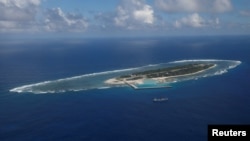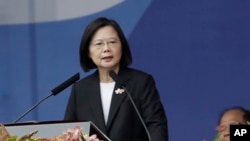Taiwan has been grappling with debates over the last week about a potential visit to an island in the disputed South China Sea by its outgoing president.
Some lawmakers from the main opposition party Kuomintang, which advocates friendlier ties with China, have urged Tsai Ing-wen, who will leave office in May, to visit Itu Aba, in the contested Spratly Islands, and assert Taiwan’s sovereignty over the island.
Taiwan took control of the 46-hectare (114-acre) islet, which Taiwan and China call Taiping Island, in 1956. China, Vietnam and the Philippines all claim sovereignty.
It hosts 200 members of Taiwan’s coast guard and contains a hospital, a farm and a runway to facilitate military resupply missions. In January, Taiwan completed a dredging project that would allow larger vessels to dock at the wharf.
In 2016, a Hague tribunal ruled that Itu Aba is not an “island,” under the U.N. Convention on the Law of the Sea, and thus not subject to claims of sovereignty.
“Since the South China Sea arbitration downgraded Taiping Island to a reef in 2016, the Tsai administration hasn’t protested against the ruling,” Ma Wen-chu, a Kuomintang legislator, wrote on her official Facebook page.
“Instead, her administration urged Kuomintang not to claim sovereignty over the South China Sea. President Tsai should really go to Taiping Island and declare Taiwan’s sovereignty over the island,” she said, adding that lawmakers from the Foreign Affairs and Defense Committee are planning a trip to the island in early May.
However, Taiwan’s foreign minister and top security official have advised the president not to take the trip at the moment, saying she should consider current regional tensions and international perception of the potential trip.
“Many countries' aircraft and ships are interfered with by relevant countries when passing through, [so] it is necessary [for the government] to assess whether the president's aircraft's flight safety can be maintained during the 1,600-kilometer flight,” Tsai Ming-yen, director-general of Taiwan’s National Security Bureau, told journalists Thursday.
Foreign Minister Joseph Wu said Wednesday that while the Taiwanese government remains committed to upholding Taipei’s sovereignty over Itu Aba, it needs to consider how other countries might interpret a potential visit to the island by Tsai.
Pointing to the standoff between China and the Philippines in the South China Sea, Wu said Taiwan “must consider how to use peaceful means to resolve the South China Sea issue, and not let others think we are creating difficulties.”
While both of Tsai’s predecessors visited Itu Aba, Tsai hasn’t made similar trips in office. Taiwan has built a runway on Itu Aba to facilitate military resupply missions, but the island is lightly defended compared with nearby islands controlled by China.
The debate comes as Taiwan prepares for the inauguration of President-elect Lai Ching-te on May 20, whom Beijing views as a “separatist.” It also follows the increased activities by Chinese coast guard vessels around disputed waters near Taiwan’s outlying Kinmen Island in recent weeks.
Some analysts said a potential visit to Itu Aba could “inflame tensions” between Taiwan and other countries with territorial claims in the South China Sea. A trip to the island by Tsai “could be used by China to further strain [cross-strait] relations,” Timothy Rich, an expert on Taiwan politics at Western Kentucky University, told VOA in a written response.
Since Itu Aba lies about 230 miles from the Philippines and is more than 900 miles from Taiwan, Rich said Taiwan’s attempt to assert sovereignty over the island through a potential trip by Tsai “could strain relations” with Manila, whose administration “seems particularly open to strengthening relations with” Taipei.
In addition to allowing China to increase pressure on Taiwan, other experts told VOA that a potential trip to Itu Aba by Tsai could also damage the diplomatic progress that Taiwan has achieved since 2016.
“A trip to Taiping Island would be counterproductive to Tsai’s New Southbound Policy and the diplomatic progress that Taipei has made with regional partners over the past 8 years,” said Ivan Kanapathy, who served on former U.S. President Donald Trump's National Security Council as director for China, Taiwan and Mongolia, in a written response.
As China maintains an aggressive posture in the South China Sea, some Taiwanese analysts think it is in Taiwan’s interest to defend its territorial interest in the disputed water through a peaceful approach.
“Since tensions remain high between China and the Philippines and Vietnam in the South China Sea, it’ll be favorable for Taiwan if the government uses more peaceful ways to safeguard its territorial integrity,” Su Tzu-yun, a military analyst at the Taipei-based Institute for National Defense and Security Research, told VOA by phone.
Growing Chinese military activities
Amid ongoing debates about the Taiwanese president’s potential trip to Itu Aba, China has increased military activities around Taiwan over the last few days. A total of 68 Chinese military aircraft and 11 Chinese naval vessels were detected in areas near Taiwan between Wednesday and Friday, according to statistics released by Taiwan’s Defense Ministry.
Su in Taiwan said the uptick in Chinese military activities around Taiwan is a way for Beijing to express its displeasure toward U.S. Secretary of State Antony Blinken’s trip to the Philippines, during which he reiterated Washington’s “ironclad” commitment to defend Manila, and Taiwanese Vice President-elect Hsiao Bi-Khim’s recent trip to the Czech Republic.
“China is showcasing its displeasure toward Washington’s and Taipei’s recent diplomatic activities by increasing the scale of its military activities around Taiwan,” he told VOA.
With less than two months until Taiwan’s President-elect Lai takes office, Rich at Western Kentucky University said China may try to keep up the pressure on his administration by increasing the frequency of its military activities around Taiwan.
“I assume China’s increased naval and air exercises around Taiwan still serve as means to persuade the Lai administration into what they see as a more pro-China policy, [but] the strategy is unlikely to bear fruit,” he told VOA.
Amid increased Chinese military activities near Taiwan, the top U.S. military commander in the Indo-Pacific warned that China remains ready to potentially invade Taiwan by 2027.
“All indications point to the PLA [China’s People’s Liberation Army] meeting President Xi Jinping’s directive to be ready to invade Taiwan by 2027,” Indo-Pacific Command chief Admiral John Aquilino told the U.S. House Armed Services Committee on Wednesday.
Kanapathy, now the senior vice president of Washington-based consultant Beacon Global Strategies, said that since China's Xi has told his military to be ready for a potential Taiwan invasion in 2027, the world “should take him at his word.”
“Beijing is investing heavily to buy down its perceived risks for an invasion operation, including by expanding lift capacity and nuclear capabilities,” he told VOA.






